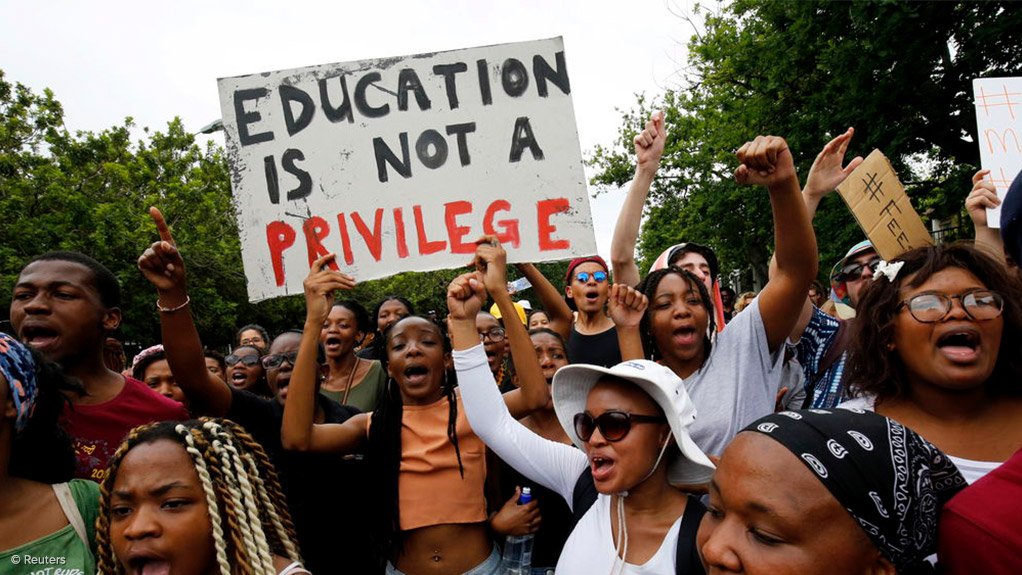Oppression is evident in how a person is perceived, treated and received in the contemporary world. It oozes through the embodiment of powerlessness in spaces of power, in unequal treatment, in self-deprecating humour and social exclusion.
This is worth remembering as the world watches South Africa’s university students protest about fee increases and a range of other grievances related to access and money. The students are reminding us that true democracy cannot be achieved without a concomitant change to material conditions.
In view of the protests, one might argue that injecting billions into higher education in South Africa will make a difference to the sector. But whatever the financial response is to the protests there is a deeper need to tackle the issue of oppression. Money can’t bring this change because oppression is not only material. It is a cancer of the soul.
Understanding oppression
Some responses to the student protests have shown that conservative public discourse in South Africa shows little sign of dissipating. To understand this and its consequences we need to examine South Africa’s history. In particular we need to look at the broader history of slavery, because there are similarities of discourses, experiences and practices in societies that share a history of slavery.
Transatlantic slavery lasted for 400 years. It not only compelled a negative ideology of blackness in the Americas, it also perpetuated the infamous Code Noir (Black Codes) which led the legalisation of black oppression and, more specifically, the treatment of slaves as property.
Slavery lasted a very long time. In the Indian Ocean islands it was instituted in the early 1700s and only ended in the 1870s. This lengthy period of enslavement was swiftly followed by colonial rule which lasted until the 1960s.
South Africa also has a long and violent history of slavery and colonisation. Slavery began at the Cape of Good Hope in 1652 and only “ended” in 1834. After that came colonialism and then apartheid. As the historian Robert Shell reveals, slavery, and its successor apartheid, created a system of hierarchies in the form of paternalism, gender discrimination and racism as well as discriminatory, labour, educational, monetary and property policies. All are still evident today.
The abolition of slavery led to the liberation of 40,000 in South Africa, 20,000 in Mauritius and 700,000 in the Americas. Slaves fought for their freedom, forming escapee or maroon communities.
Resistance was evident in many spaces and places. They engaged in direct struggle and hidden resistance, using song, dance, oratory and art to cope with and transcend oppressive conditions. They also contributed to the rise of creolised communities and languages, new cultural formations espousing values and practices unique to their locales. In sum they engaged with oppressors, forcing them to see and hear them.
Given this shared history and shared global inequality, it is possible to draw parallels between the situation of oppression in South Africa and the oppression experienced in other slave descendant societies.
Pernicious persistence of stereotypes
When I studied the situation of slave descendants I found that they were stereotyped as lazy, drunk, unintelligent and irrational. Dominant groups reinforced hierarchy and segregation using both racist ideology and force.
In Mauritius an intensive analysis of slavery and the dispossession of slaves was initiated only 171 years after abolition. Today, very little mention is made of the dispossession of African descendants and equally little has been done since the government research and analysis of slavery and its consequences was completed. A European descended minority still controls the lions share of the country’s resources.
Going back to the islands over the past ten years, I found that many slave descendants are still poor and have little formal education. Many of them have never seen the inside of a university. This is ironic given that the societies in which some of these slave descendants live are wealthy.
Tackling contemporary oppression
Contemporary experiences of oppression in South Africa will be complex, costly and difficult to address. Without a doubt we need to address wealth disparities. But those involved in the nation-wide protests need to investigate and respond to historical and social injustices. A longer-term view of deep social change is necessary, as well as a more diverse view of resistance.
Studies of slave societies show that resistance is a complex process. In each case we see different kinds of leadership and resistance tactics.
In slave descendant societies, and contemporary unequal societies, there are those who offer thought provoking critique and moral leadership. Then there are those who occupy the front line and directly engage oppressors. Third, there are those who endure.
Sometimes, as in the case of Steve Bantu Biko and Nelson Mandela, all the characteristics appear in one person. Such extraordinary individuals also provide critical insight into resistance.
To encounter the diversity of means available to bring about meaningful change students engaged in the ongoing protests would do well to read widely, ask questions and engage people different to themselves. Students have won the first necessary victory by securing a zero increase in fees in 2016. But to understand the complex nature of oppression and how to respond to it will require systematic engagement in many struggles over a longer period of time.
![]() Written by Rosabelle Boswell, Professor of Anthropology and Executive Dean of Arts, Nelson Mandela Metropolitan University
Written by Rosabelle Boswell, Professor of Anthropology and Executive Dean of Arts, Nelson Mandela Metropolitan University
This article was originally published on The Conversation. Read the original article.
EMAIL THIS ARTICLE SAVE THIS ARTICLE
To subscribe email subscriptions@creamermedia.co.za or click here
To advertise email advertising@creamermedia.co.za or click here











